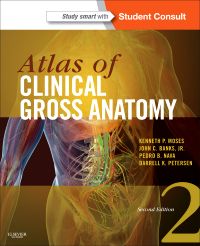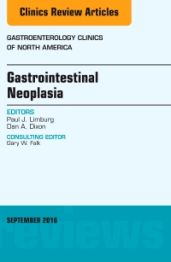Gastrointestinal Neoplasia, An Issue of Gastroenterology Clinics of North America, 1st Edition
Authors :
Paul J. Limburg & Dan A. Dixon
Gastrointestinal (GI) cancers account for nearly 150,000 deaths each year, in the United States alone. Encouragingly, environmental risk factors, premalignant conditions, and high-risk familial kindreds are well described for many GI cancers. In th
...view more
Gastrointestinal (GI) cancers account for nearly 150,000 deaths each year, in the United States alone. Encouragingly, environmental risk factors, premalignant conditions, and high-risk familial kindreds are well described for many GI cancers. In this comprehensive volume on GI Neoplasia, all luminal cancers will be discussed, along with pancreas cancer, gastrointestinal stromal tumors (GISTs), carcinoid tumors, and neuroendocrine tumors. Hepatobiliary cancers are not addressed, as these tumors could form the basis of a separate volume. Articles are organized to address several key topics for each cancer type, such as: public health burden, molecular pathways, risk and protective factors, early detection, clinical evaluation, management, and survivorship.
Your discount code here : #FB456
Gastrointestinal (GI) cancers account for nearly 150,000 deaths each year, in the United States alone. Encouragingly, environmental risk factors, premalignant conditions, and high-risk familial kindreds are well described for many GI cancers. In this comprehensive volume on GI Neoplasia, all luminal cancers will be discussed, along with pancreas cancer, gastrointestinal stromal tumors (GISTs), carcinoid tumors, and neuroendocrine tumors. Hepatobiliary cancers are not addressed, as these tumors could form the basis of a separate volume. Articles are organized to address several key topics for each cancer type, such as: public health burden, molecular pathways, risk and protective factors, early detection, clinical evaluation, management, and survivorship.
Author Information
By Paul J. Limburg, MD, Mayo Clinic Rochester, Rochester, MN and Dan A. Dixon, PhD, Kansas University Medical Center, Kansas City, Kansas
| ISBN Number | 9780323462570 |
|---|---|
| Main Author | By Paul J. Limburg, MD and Dan A. Dixon, PhD |
| Copyright Year | 2016 |
| Edition Number | 1 |
| Format | Book |
| Trim | 152w x 229h (6.00" x 9.00") |
| Imprint | Elsevier |
| Page Count | 0 |
| Publication Date | 28 Aug 2016 |
| Stock Status | IN STOCK - This may take up to 5 business days to ship |
Write Your Own Review
Only registered users can write reviews. Please sign in or create an account
product
https://www.us.elsevierhealth.com/gastrointestinal-neoplasia-an-issue-of-gastroenterology-clinics-of-north-america-9780323462570.html
2382
Gastrointestinal Neoplasia, An Issue of Gastroenterology Clinics of North America
https://www.us.elsevierhealth.com/media/catalog/product/9/7/9780323462570.jpg
64.34
98.99
USD
InStock
/Medicine/Gastroenterology
/Clinics
/Clinics
117
4388725
5255041
1
3
8
4182692
5145120
Gastrointestinal (GI) cancers account for nearly 150,000 deaths each year, in the United States alone. Encouragingly, environmental risk factors, premalignant conditions, and high-risk familial kindreds are well described for many GI cancers. In this comprehensive volume on GI Neoplasia, all luminal cancers will be discussed, along with pancreas cancer, gastrointestinal stromal tumors (GISTs), carcinoid tumors, and neuroendocrine tumors. Hepatobiliary cancers are not addressed, as these tumors could form the basis of a separate volume. Articles are organized to address several key topics for each cancer type, such as: public health burden, molecular pathways, risk and protective factors, early detection, clinical evaluation, management, and survivorship. Gastrointestinal (GI) cancers account for nearly 150,000 deaths each year, in the United States alone. Encouragingly, environmental risk factors, premalignant conditions, and high-risk familial kindreds are well described for many GI cancers. In this comprehensive volume on GI Neoplasia, all luminal cancers will be discussed, along with pancreas cancer, gastrointestinal stromal tumors (GISTs), carcinoid tumors, and neuroendocrine tumors. Hepatobiliary cancers are not addressed, as these tumors could form the basis of a separate volume. Articles are organized to address several key topics for each cancer type, such as: public health burden, molecular pathways, risk and protective factors, early detection, clinical evaluation, management, and survivorship.
0
0
add-to-cart
9780323462570
2016
Professional
By Paul J. Limburg, MD and Dan A. Dixon, PhD
2016
1
Book
152w x 229h (6.00" x 9.00")
Elsevier
0
Aug 28, 2016
IN STOCK - This may take up to 5 business days to ship
By <STRONG>Paul J. Limburg</STRONG>, MD, Mayo Clinic Rochester, Rochester, MN and <STRONG>Dan A. Dixon</STRONG>, PhD, Kansas University Medical Center, Kansas City, Kansas
Clinics
Clinics
The Clinics: Internal Medicine
No
No
No
No
Please Select
Please Select
Please Select
Related Products
-
35% OFF
 Online Resource
Netter's Dissection Video Modules (Retail Access Card)
Online Resource
Netter's Dissection Video Modules (Retail Access Card)University of North Carolina Chapel Hill and Frank H. Netter
Oct 2015
Special Price $117.64 $180.99 -
35% OFF
 Book
Book
-
30% OFF
 Book
Nolte's The Human Brain in Photographs and Diagrams
Book
Nolte's The Human Brain in Photographs and DiagramsTodd W. Vanderah
Jan 2019
Special Price $44.79 $63.99 -
35% OFF
 Flash Cards
Flash Cards
-
35% OFF
 Flash Cards
Flash Cards
-
30% OFF
 Book
Book
-
35% OFF
 Flash Cards
Flash Cards
-
35% OFF
 Book
Book
-
35% OFF
 Book
Book
-
35% OFF
 Book
Book




